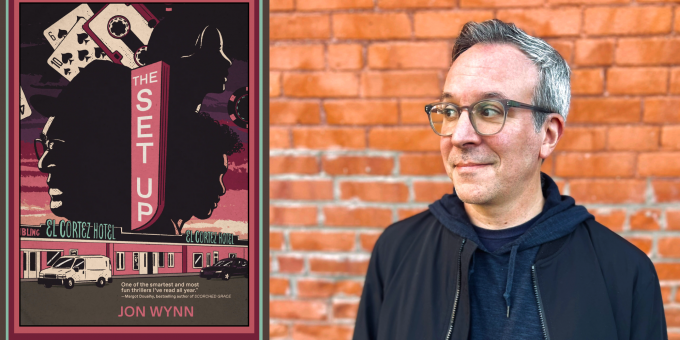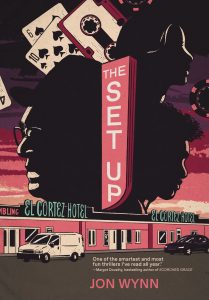
Novel/Sociology: An Interview with Jonathan Wynn, Author of The Set Up
Jonathan Wynn, UMass sociologist and author of The Tour Guide, Music/City, and The City and the Hospital, has a new book out today—and the fact that it’s a novel isn’t the only twist! We reached out to this long-time friend of Contexts (fun fact: he was a student editor for us once upon a time) about the “terrific fun” of writing what we imagine is best-described as his first novel, Belt Publishing’s much-anticipated The Set Up.
Amin Ghaziani [AG]: Hiya Jon, what a pleasure to learn more about your first novel, The Set Up, which comes out on May 20th! Right off the bat, I’d love to ask you, a card-carrying sociologist who’s written and co-written three academic books (plus another on the way), to describe for us the process of shifting into fiction writing. What was the sweetest part?
Jonathan Wynn [JW]: What a lovely question. The sweetest part has been sharing drafts with my students. The last few semesters I’ve used a draft of the book as one of several options students could pick for an end-of-semester ‘sociological book report.’ Students always surprise me with their writing, but they’re picking up on things I missed in my own book! Last semester a student wrote about how using third person omniscient point of view is an inherently sociological approach to fiction! I was floored. I wrote a ‘study guide,’ with question prompts and additional readings broken down by themes, for instructors who want to use the book in class as well.
AG: What about some of the challenges that arose for you?
JW: They were many and varied: from writing in a non-academic voice and building an expansive whodunnit mystery, to being playfully teased by my colleagues for writing a novel and having impostor syndrome for it. At the same time, I can’t lie. It was terrific fun.
AG: And how much sociology did you smuggle in?
JW: A lot. My goal was to write a book my students and the broader public would want to read cover-to-cover, while also sneaking in sociological insights. One of the biggest challenges was jettisoning concepts to better serve the overall pacing. My initial idea was that one of the characters would be a sociologist who gives mini-lectures throughout the book. I had to scrap that to help the story click. Still, I found writing fiction allowed me to write more sociology, not less. I was free to draw from the best of the discipline. The world needs our ideas now more than ever, and this book is very much a love letter to the field.
AG: Since we’re talking about the writing, I’m interested: What stood out in the process of character-building? How was it similar to or different from incorporating research respondents into your past work?
JW: As a qualitative researcher, I’ve always paid attention to portraying people with richness and care. I use real names in my studies, so if I didn’t do a good job, I’d hear from them! I’ve also written about how ethnographies use certain writing conventions to create characters, from Nels Anderson’s The Hobo to Peter Bearman’s Doormen, as tools for analyzing social types: from analyzing their ‘tricks of the trade’ to their career paths to their institutional ties. I definitely drew from that research.
I would also mention that writing characters who were, well, not white straight men, was a weighty responsibility. Aside from the story, this was my #1 concern. Readers of contemporary fiction might be familiar with controversies around this issue. (Look up the debate around Jeanine Cummins’ American Dirt, a book about Mexican immigrants written by a white author.) Not only did I enlist several ‘sensitivity readers’ (as they’re called in the business), but I endeavored to read from an even broader palate of sociology than I usually do with my characters in mind. I did my best to not only traverse the very high bar we should expect from all authors but, as a sociologist, I hope I raised it.

AG: So, what can you tell us about, well, what The Set Up is about? Pull us into the story.
JW: It’s about a rogue guerilla-marketing agency in Las Vegas that employs actors in everyday situations to manipulate peoples’ behaviors, whether it’s buying a smartphone app or convincing someone to leave a strip club. It’s Ocean’s Eleven meets Charlie’s Angels meets Erving Goffman. Things go awry, people die in suspicious circumstances, and three very different characters are pulled together to navigate the backstage world of everyday life. They learn that the very real model of hiring actors—whether it’s Japan’s Rent-a-Family industry, or a business hiring mystery shoppers, or a presidential candidate paying people at a rally—can have a dark side to it.
AG: It’s extremely cool that yours has been selected as a “most anticipated book”—how does it feel to have written a novel that so many people are looking forward to?
JW: That’s flattering, and I hope it’s the case. I want to say that I absolutely had Contexts readers in mind when I wrote the book. I was a student editor for Contexts in graduate school, and I’ve always loved the mission of the magazine.
AG: Finally, you know our team at Contexts loves the visual elements of storytelling. What part did you get to play in choosing the moody, revamped-retro cover art for The Set Up?
JW: David Wilson is the Creative Director at Belt Publishing, and all the credit goes to him. He 100% nailed the vibes. I loved working with a small indie press like Belt.
Amin Ghaziani, co-editor of Contexts, is in the Department of Sociology at the University of British Columbia. He is the author, most recently, of Long Live Queer Nightlife.
